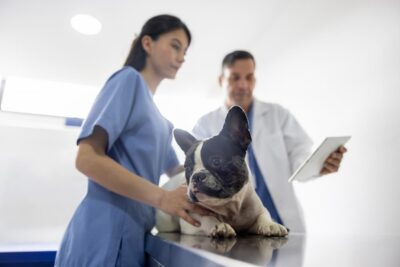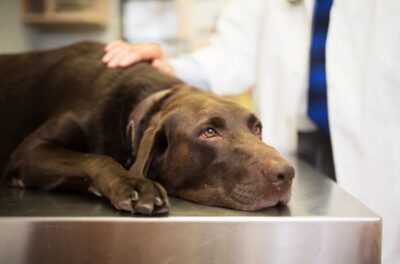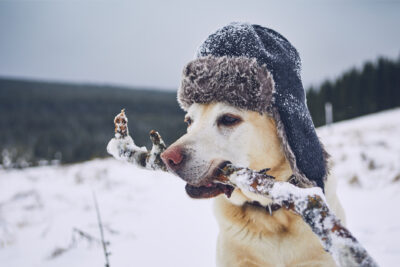The Hidden Dangers of Loose Stools In Dogs

All featured products are chosen at the discretion of the GreatPetCare editorial team and do not reflect a direct endorsement by the author or reviewer.
Us pet parents are often very in tune with our dogs’ pooping habits. After all, we have to pick it up when they go outside. And on occasion — especially when something is wrong — we may find ourselves cleaning up inside messes, too!
Bouts of loose stool happen to most dogs from time to time. In fact, symptoms of gastrointestinal upset — like vomiting, diarrhea, or loose stool — are among the top reasons that pet parents take their dogs’ to the veterinarian. A 2019 report by Healthy Paws Pet Insurance listed an upset stomach as the most common claim filed for dogs, making up over a quarter of all processed claims (1).
When it comes to health in both humans and animals, more and more researchers are studying the gut microbiome — a mixture of bacteria and other microorganisms that live inside our stomach and intestines.
The balance of the microbiome plays an important role in normal digestion. And we are learning more each day about how much it affects our overall health. When things are out of whack with the microbiome, loose stool is a common result.
Causes of Loose Stool In Dogs

There are many different causes of loose stool in dogs. To keep your dog’s gut healthy and minimize the mess, be on the lookout for these common causes:
Abrupt change in diet
One of the most common causes of loose stool can happen if pet parents switch from one brand or type of food to another without performing a gradual diet transition. In general, eating anything that is out of the normal for a dog can cause loose stool. Dogs with a habit of eating food off of the ground or getting into the trash will commonly experience loose stool from this behavior.
Food allergies
Dogs with food allergies or intolerances will often have loose stools and may also vomit or experience weight loss. If your dog has ongoing or frequent bouts of loose stool, discuss food allergy or intolerance testing methods with your veterinarian.
Infections
Dogs infected with different parasites, bacteria, and viruses commonly experience loose stools. That’s why testing fecal samples is so important with any case of diarrhea or loose stool in dogs. Common intestinal parasites in dogs include roundworms, hookworms, and Giardia. These parasites also have the potential to be zoonotic, meaning they can infect humans!
Certain types of bacteria can also cause your dog to have loose stools. Many times this will be due to intestinal dysbiosis, a condition in which the normal mixture of bacteria in the microbiome is disrupted and the harmful bacteria increase in numbers. Feeding dogs raw food diets can also expose them to harmful bacteria, like Salmonella and E. coli, which can lead to loose stools, especially in young dogs or those with decreased immune function.
Another serious cause of loose stools in puppies or unvaccinated dogs is parvovirus (or parvo). This infection can be life-threatening. And any puppy with loose stool — especially when accompanied by vomiting, lethargy, and decreased appetite — should be examined by a veterinarian right away.
Stress
According to recent research on the gut-brain connection, stress can also cause some dogs to have loose stools. Studies show that the gut microbiome affects the way that the body responds to stress and that stress can negatively impact the gut (2).
Other causes of loose stools in dogs include certain cancers, inflammatory bowel disease (IBD), certain medications, pancreatitis, exocrine pancreatic insufficiency (EPI), toxins, kidney disease and liver disease.
Hidden Dangers of Loose Stools In Dogs

Often, loose stool in a dog can be mild and resolve on its own. However, in some cases, loose stools can indicate a serious problem and even be life-threatening.
While that may sound scary, there are key symptoms and signs pet parents can look for, to help differentiate between a mild or more serious case of loose stools.
Loose stools can be a symptom of various underlying health issues. Should your dog require veterinary intervention or the services of a specialist, such as a gastroenterologist, a pet health insurance plan can help manage expenses. A customized policy may cover diagnostic tests, medications, and even prescription food if needed to treat a covered condition.
If you notice any of these warning signs, call your veterinarian to discuss your dog’s health and demeanor in more detail. A visit to the clinic may be required to properly diagnose and treat your pet.
Dehydration
When dogs have multiple loose stools in a day—called diarrhea—they can lose more water than they consume, which leads to dehydration.
When to call your veterinarian:
- Your dog has diarrhea that does not resolve quickly, especially if the diarrhea is very liquid, frequent, or voluminous.
- Lethargy (acting tired or sleepy)
- Sticky gums
- Sunken-in eyes
- Loss of skin elasticity
It is very important to have your dog seen right away if you notice any of these symptoms as dehydration may become life threatening.
Malnutrition
When loose stool or diarrhea become chronic (lasting more than 2 to 3 weeks), symptoms of malabsorption and malnutrition may start to become apparent, especially if the diarrhea is due to IBD, EPI or cancer. When the intestines are inflamed they will not absorb nutrients appropriately and over time this can have serious consequences.
When to call your veterinarian:
- Unusual weight loss
- Loss of muscle mass
- Lethargy
- Dull coat
Electrolyte Imbalance
Severe diarrhea can also lead to electrolyte imbalances, commonly causing low sodium, chloride, and potassium levels. This is cause for concern, especially for dogs suffering from other health issues.
When to call your veterinarian:
- If your dog experiences loose stool and also has Addison’s disease. Depleted sodium levels due to loose stool can lead to seizures.
- If your dog experiences loose stool and also has parvo. Severely low levels of potassium in dogs with parvo can prevent the muscles in the body from functioning normally.
Sepsis
In some cases, such as in hemorrhagic gastroenteritis (HGE, also called acute hemorrhagic diarrhea syndrome or AHDS) or parvo infections, dogs may become septic. Sepsis is a severe inflammatory response to an infection that affects the entire body. Sepsis requires hospitalization, and if not treated quickly, it can lead to shock, organ failure, and death.
When to call your veterinarian:
- Severe explosive diarrhea or stool containing a large amount of blood
- Vomiting
- Lethargy
- No appetite
What To Do When Your Dog Has Loose Stools

If your dog has loose stools that last beyond a few days, has episodes that come and go, has stool that is very watery or bloody, or has any additional symptoms — such as vomiting, weight loss, loss of appetite, or lethargy — take your pet to see your veterinarian without delay.
Acting fast when you notice these symptoms is the best way to ensure your veterinarian can appropriately diagnose and treat serious health complications.
With luck, your veterinarian can rule out serious issues. In that case, as with most mild cases of loose stool, your veterinarian is likely to recommend a bland diet, anti-diarrheal medications, and/or probiotics.
What To Feed A Dog With Loose Stools
When dogs are having loose stools, they should typically be fed a bland diet that is easy to digest. Make sure to avoid feeding high-fat foods or treats when your dog is having tummy troubles, as this can make things worse.
The best dog food for acute cases of loose stools (diarrhea that has been going on for less than two weeks) is typically going to be a prescription diet specifically formulated for gastrointestinal upset.
These diets will be highly digestible, they contain prebiotics—fiber that helps to feed beneficial gut bacteria—may be low in fat, contain compounds that help decrease intestinal inflammation, and contain lots of moisture (if canned forms are used). These diets are formulated to be complete and balanced so, if necessary, they can be fed long term.
A home-cooked bland diet may also be recommended for acute diarrhea. A common recommendation is unseasoned, skinless, boiled chicken breast and plain white rice. This type of diet should only be fed for a short period of time as it is not nutritionally complete and balanced enough for long-term feeding.
Pet parents can also try adding a few tablespoons of plain canned pumpkin to their dog’s diet. The fiber in the pumpkin may help to firm up the stools, and most dogs love the taste!
In cases of chronic diarrhea, your pup’s veterinarian may recommend trying a prescription hydrolyzed or novel protein diet. Dogs with food allergies or intolerances and those with IBD will often improve on these diets.
Probiotics For Dogs With Loose Stools
Probiotics can be very beneficial to dogs with loose stool. When dogs eat anything out of the ordinary or have certain medical conditions, it can cause a shift in their normal gut microbiome which can then lead to diarrhea.
Probiotics contain healthy bacteria that help to rebalance things in the gut. And studies show that using certain strains of probiotics may decrease the harmful bacteria that cause diarrhea (3). Probiotics have also been shown to improve the body’s immune function (3).
Make sure to consult with your veterinarian prior to purchasing a probiotic for your pet. Probiotics are not regulated in the same way that medications are, so you will want to choose a probiotic that is backed by scientific research.
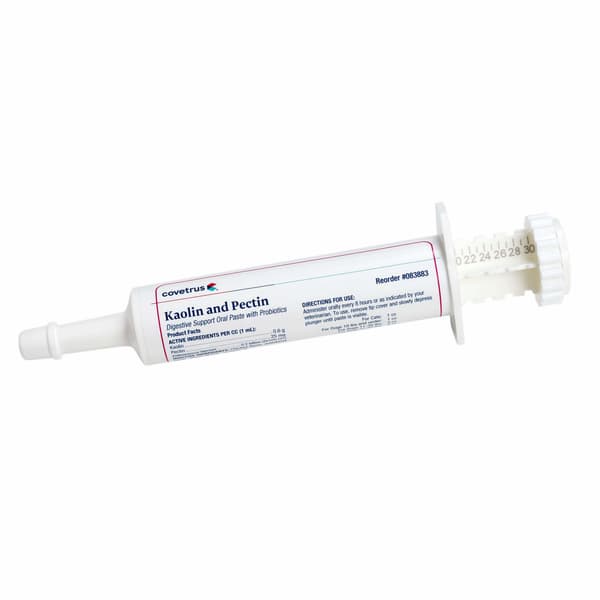

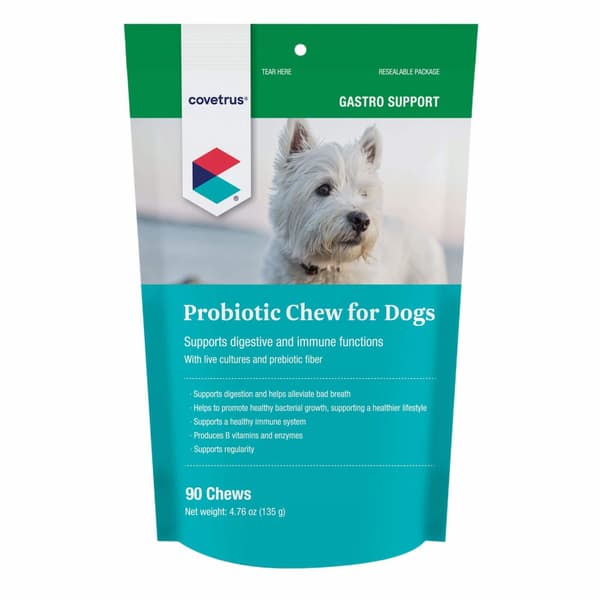
Preventing Loose Stools in Dogs
While there are many different reasons for a dog’s loose stool, an abnormal gut microbiome is typically a cause or the result of the underlying cause. A healthy gut microbiome is crucial for a dog’s overall health and for healthy firm stools. Feeding your dog a well balanced healthy diet is the first step to maintaining a healthy gut. If your dog is experiencing loose stool, that is her body telling you that something isn’t right, and if the symptoms don’t quickly resolve there may be serious health risks.

